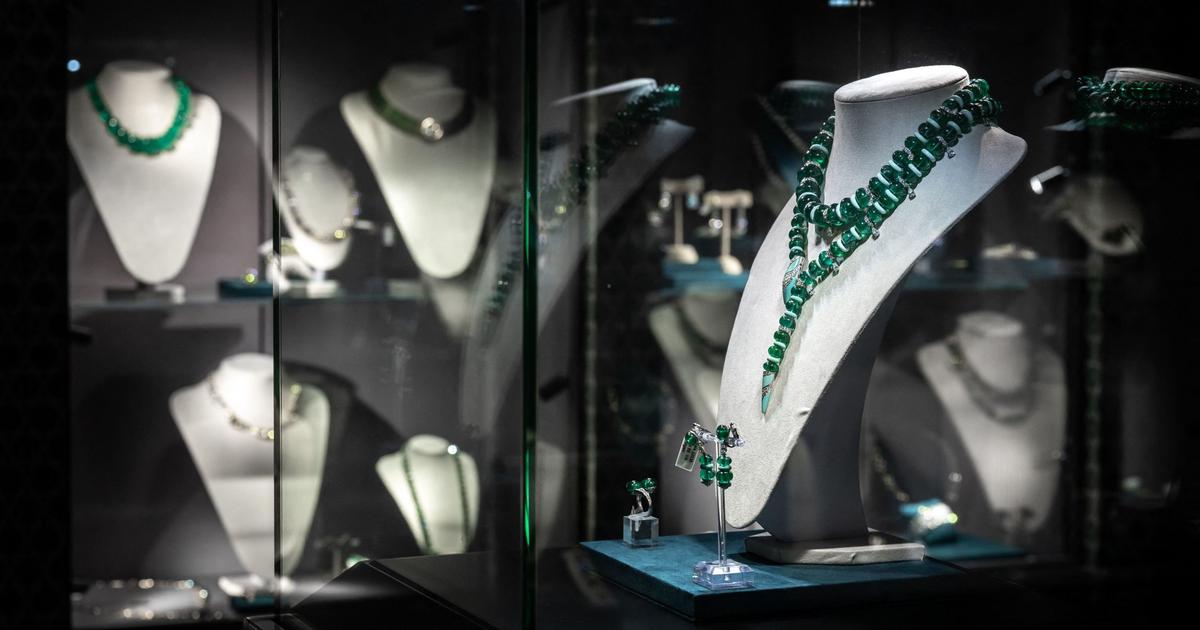Hundreds of jewels by Austrian billionaire Heidi Horten are offered in May by Christie's, but organizations are calling for the auction to be suspended because of her husband's ties to the Nazis. The Simon Wiesenthal Center, which specializes in tracking down former Nazis, opposes the sale even though it is meant to benefit charity because Helmut Horten built his fortune in Germany under the Nazi Party, of which he was a member for a time.
One of the centerpieces of this collection of 700 jewels that was in the possession of Heidi Horten (1941-2022) is a Cartier ring set with a 25.59-carat "pigeon blood" ruby, estimated between $15 million and $20 million, said Rahul Kadakia, international director for jewelry at Christie's, at Monday's presentation. "We also have the Briolette d'Inde," a 90.36-carat diamond "of color D, the whitest, estimated between 10 and 15 million dollars," attached to a necklace formed by a myriad of small white diamonds, he added.
This briolette diamond had been acquired by Cartier in 1909, before being sold to the banker George Blumenthal in 1911 and then to the jeweler Harry Winston in 1946, then allegedly sold to a maharaja a year later. Subsequently bought several times, it was acquired by Heidi Horten in 1971. Other flagship lots include a necklace of three rows of natural pearls, clasp with an 11.15 carat pink diamond (estimated at $7-10 million). Another necklace, less expensive (estimated at 500,000-700,000 dollars), but very imposing, in gold and diamonds, has as a pendant a very large emerald of 362.45 carats of the 19th century carved representing a scene from the Hindu mythological epic Ramayana.
This "quite extraordinary" collection is valued between $150 million and $200 million, according to Rahul Kadakia. "The last time Christie's held an auction of this level was in 2011, when we sold Elizabeth Taylor's collection, which brought in about $145 million in two days, and there were 400 pieces of jewelry," he said. This time, "in order not to have as many jewelry on the market at the same time," sales were spaced out.
" READ ALSO Jewish spoliations: Elizabeth Royer-Grimblat, researcher of paintings
«Doing good»
Thus, 300 lots are offered online from May 3 to 15, less than 100 will be scattered in theaters on May 10, 150 on May 12, and about 300 others online in November. According to the Forbes ranking, the fortune of Heidi Horten, who died in June 2022, amounted to $ 2.9 billion.
The Briolette d'Inde, a diamond of 90.36 carats "of color D, the whitest, estimated between 10 and 15 million dollars". FABRICE COFFRINI / AFP
But the origin of her husband's fortune, who owned one of the largest department store chains in Germany, drew criticism. In 1936, three years after Adolf Hitler became German Chancellery, he took over the Alsberg textile company after its Jewish owners fled, before taking over several other Jewish-owned stores before the war.
He was later accused of profiting from the "Aryanization" of Jewish property (spoliation measures aimed at transferring ownership of businesses owned by people of Jewish origin). In recent days, the Simon Wiesenthal Center and the American Jewish Committee have called on Christie's to suspend the sale. "Do not reward those whose families were able to enrich themselves thanks to desperate Jews targeted and threatened by the Nazis," Rabbi Abraham Cooper, one of the leaders of the Simon Wiesenthal Center, said in a statement.
But the auction house agreed to organize it because "all proceeds from the sale will go to charity, (...) and Christie's is separately making a significant donation to Holocaust research and education," Kadakia said. "We are therefore convinced that in the end, the proceeds of the sale will do the good." For the American Jewish Committee, this is not enough: the sale must be suspended "until a serious effort is made to determine how much of this wealth came from Nazi victims," with a view to returning it to survivors and educational programs.

